Coronavirus (COVID-19) and Waste Pickers

- 1. Recommendations
- 2. Shared Experiences from Waste Pieckers around the world
- 3. How is your organization dealing with Coronavirus?
Document last updated in March 2021. Check World Health Organization for more up to date information.
# 1. Recommendations for Waste Pickers and their organizations against Coronavirus

Background
These recommendations were originally produced (March 25th, 2020) to provide answers to the questions and difficulties that waste picker groups were facing in the early days of the COVID-19 pandemic. What you read now is an updated version.
This document is meant to provide ideas for how waste pickers and other waste workers can protect themselves and advocate for safer working conditions in the face of COVID-19. The recommendations in this document are based on the feedback and advocacy content of dozens of waste picker organizations from around the world, reports on COVID-19 treatment and management, recommendations by the World Health Organization, as well as advice from epidemiologists[ref]WIEGO’s Cuidar project in Brazil, which has focused on the mapping of waste pickers’ health risks in the workplace, engaged with experts in epidemiology and labor medicine from the University of Brasília and the Health Foundation of Minas Gerais to elaborate recommendations for waste pickers.[/ref] on select issues.
Representatives of the Global Alliance of Waste Pickers has attempted to validate and improve recommendations made by waste picker groups through a review of available literature on COVID-19, so that waste picker organizations can make the most informed decisions possible for their workers and workplaces. This document is intended primarily as a resource for waste picker organizations, but is also useful more generally for other entities involved with waste collection of materials that are potentially contaminated by COVID-19.
Disclaimer
Research on the transmission of COVID-19 is still in early stages. While we will try to keep these recommendations updated, but please always refer to local and National authorities. Where we have made recommendations based on incomplete data, we have tried to cite the different arguments and findings and have erred on the side of caution by deferring to the most conservative information available. In general, we advise that workers and organizations follow the advice of their national health authorities.
What is Coronavirus/COVID-19
How does COVID-19 spread?
COVID-19 is airborne. People can catch COVID-19 from others who have the virus just by breathing the air that an infected person has exhaled.
Outbreaks have been reported in restaurants, choir practices, fitness classes, nightclubs, offices and places of worship where people have gathered, often in crowded indoor settings where they talk loudly, shout, breathe heavily or sing.
The risks of getting COVID-19 are higher in crowded and inadequately ventilated spaces where infected people spend long periods of time together in close proximity. These environments are where the virus appears to spread by respiratory droplets and aerosols more efficiently, so taking precautions is even more important.
Who is at risk?
What are the Symptoms of COVID-19?
What to do if you have symptoms
How waste pickers can protect themselves against Covid-19
General advice for all people
| Masks should be worn when in proximity to other people. See more information below about who should wear which types of masks. | |
| Avoid places closed or poor ventilated spaces with many people. Remain at least 2 meters, but take in account that as the virus is airborne no distance is safe enough in closed spaces. | |
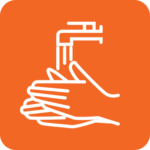 | Frequently wash your hands with soap and water for at least 20 seconds, and wash all parts of the hand. Wash your hands: upon returning home, before and after eating or smoking, after touching shared objects (including money), after sneezing or coughing, before and after touching your face. |
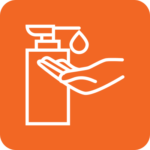 | Use sanitary gel with at least 70% alcohol[ref]CDC https://www.cdc.gov/coronavirus/2019-ncov/prepare/cleaning-disinfection.html[/ref], or straight 70%+ isopropyl alcohol, when hand washing is not possible. Sanitary gel only works if hands are not too dirty or greasy. |
| Regularly disinfect frequently used surfaces and objects like cell phones. | |
| Do not greet people with handshakes, kisses and hugs. | |
| Avoid touching your face. Wash your hands before and after touching your face | |
| Avoid sharing anything that touches the face including drinking glasses, straws, pillows, towels, smoking devices, etcetera. | |
| Cough or sneeze into the inside of your elbow, or into a tissue and immediately dispose of the tissue. Wash your hands immediately after sneezing or coughing. | |
| Remove shoes and potentially contaminated clothing before entering your home. | |
| Drink plenty of clean water, eat healthy foods, and get plenty of sleep to keep your immune system strong. | |
| If you have been exposed to anyone who was diagnosed with COVID-19, quarantine yourself for at least 15 days and inform others who may have also been exposed. | |
| Self-isolate by staying at your residence if you begin to feel unwell, even with mild symptoms such as headache, low grade fever (37.3 C / 99.1 F or above) and slight runny nose, until you recover. If it is essential for you to have someone bring you supplies or to go out (to buy food for example), then wear a mask to avoid infecting other people. | |
| Keep updated on the latest COVID-19 hotspots (cities or local areas where COVID-19 is spreading widely) and, if possible, avoid traveling to those places– especially if you are high risk. |
Additional advice for waste workers

Regularly clean commonly touched surfaces with at least 70% alcohol or soap and water [ref]National Geographic https://www.nationalgeographic.com/science/2020/03/why-soap-preferable-bleach-fight-against-coronavirus/[/ref].
| Try to work in well-ventilated places only. | |
| People in high risk groups should not go to work. All others should work alone or in small groups maintaining at least 1 meter (3 feet) of distance from each other. If workers are in groups, maintain the same groups day after day so that if someone falls ill with COVID-19 it will be easier to identify and quarantine others who were exposed. | |
| Assume that any recyclable or waste materials that you are handling may be contaminated by the virus. Coronaviruses are believed to live on surfaces for up to 9 days[ref]G.Kampfa, D. Todt, S.Pfaender, E.Steinmannb. Persistence of coronaviruses on inanimate surfaces and their inactivation with biocidal agents. Journal of Hospital Infection Volume 104, Issue 3, March 2020, Pages 246-251. https://doi.org/10.1016/j.jhin.2020.01.022[/ref]. | |
| Avoid exposure to fumes or dust from waste materials, especially when waste is being dumped or compacted [ref]Doremalen N, Bushmaker T, Morris DH, Holbrook MG, Gamble A, Williamson BN, Tamin A, Harcourt JL, Thornburg NJ, Gerber SI, Lloyd-Smith JO, Wit E, Munster VJ (2020). Aerosol and surface stability of HCoV-19 (SARS-CoV-6 2) compared to SARS-CoV-1. medRxiv 2020.03.09.20033217. doi: https://doi.org/10.1101/2020.03.09.20033217[/ref]. | |
| Workers with long hair should tie their hair back to avoid contaminating their face. | |
| Wear gloves when working, but be aware that your gloves may contaminate surfaces and spread COVID-19 if not handled properly. Avoid putting your gloves in your pocket (better to store them in a designated plastic bag). Never touch your gloves to your face. | |
 | Wash hands with soap and water before and after collection routes and any time you remove your gloves. |
 | Have a minimum 70% alcohol solution with you to sanitize hands when water and soap are not available. |
| Use work gear, including gloves, and cover your skin and hair as much as possible while working. Remove clothing (including shoes) and gear before entering your home. | |
| Shower after finishing your route and wash your collection clothes and gear daily. | |
| Avoid touching and sorting materials that indicate illness, such as tissues, masks, containers for medications like cough syrup, etc., or that appear to be marked as hazardous. Avoid picking through materials you can’t properly see. | |
| Establish systems of communication with your colleagues so that people can be informed if someone falls ill or needs assistance. | |
| Establish protocols for if a worker is diagnosed with COVID-19. |
Face masks: wear them!
![]()
Masks should be used as part of a comprehensive strategy of measures to suppress transmission and save lives; the use of a mask alone is not sufficient to provide an adequate level of protection against COVID-19. Source: All about masks in the context of COVID-19 (WHO)
Masks should be worn when in proximity to other people. Masks should be well fitting and form a seal around the nose and mouth. Medical grade masks should be worn by the following people:
- Health workers in clinical settings.
- Anyone who is feeling unwell, including people with mild symptoms, such as muscle aches, slight cough, sore throat or fatigue.
- Anyone awaiting COVID-19 test results or who has tested positive.
- People caring for someone who is a suspected or confirmed case of COVID-19 outside of health facilities.
- People with health risks (People aged 60 or over, and people of any age with underlying health conditions, including chronic respiratory disease, cardiovascular disease, cancer, obesity, immunocompromised patients and diabetes mellitus).
Non-medical, fabric masks can be used by the general public under the age of 60 and who do not have underlying health conditions. More info at WHO.
If COVID-19 is spreading in your community, stay safe by taking some simple precautions, such as physical distancing, wearing a mask, keeping rooms well ventilated, avoiding crowds, cleaning your hands, and coughing into a bent elbow or tissue. Check local advice where you live and work. Do it all!
Make wearing a mask a normal part of being around other people. The appropriate use, storage and cleaning or disposal of masks are essential to make them as effective as possible.
Here are the basics of how to wear a mask:
- Clean your hands before you put your mask on, as well as before and after you take it off, and after you touch it at any time.
- Make sure it covers both your nose, mouth and chin.
- Adjust properly.
- When you take off a mask, store it in a clean plastic bag, and every day either wash it if it’s a fabric mask, or dispose of a medical mask in a trash bin.
- Don’t use masks with valves.
Respirators like n95 or n99 face masks can protect people from contracting COVID-19 if they are exposed to an infected person as long as the mask is clean and fits snugly around the face. Note that air purifying respirators with an exhalation valve might expel droplets from a cough or sneeze through the exhalation valve and so should not be worn.
Advocacy
Ask your cooperative, association or employer:
- To systematize COVID-19 infection prevention measures at the workplace, including systems of coordination so that workers can be informed if one of their workmates falls ill or needs assistance.
- Make sure closed spaces are properly ventilated.
- To post updated information about COVID-19 and how your city is responding.
- To provide handwashing stations with clean water and liquid soap at the work site.
- To provide sanitary gel and protective gear for workers.
- To keep the work space well ventilated and to regularly sanitize commonly used surfaces.
- To guarantee compensation for workers who become sick from COVID-19; who are forced to remain at home to care for children out of school or infected people; or who must avoid work because they qualify as high-risk.
- Consider grouping workers into work ‘pods/bubbles’ wherein the same workers are together day after day to reduce the spread of transmission if someone falls ill.
Ask residents:
- To separate waste in the way that your organization deems safest for your workers. Many cooperatives are advising that households separate waste into three categories: organic waste, dry waste, and hazardous waste (which includes bathroom waste and anything that may be contaminated with COVID-19). Some cooperatives have launched campaigns asking residents to mark hazardous waste with a big red dot or some standard mark. Many places are asking that potentially hazardous waste be sealed in two plastic bags and set aside for at least 72 hours before placing it out for collection.
- To help workers with outdoor access to soap and water for handwashing, and share other resources that waste pickers may be lacking.
- To thank their local waste pickers for the services they are providing.
Ask leaders and government officials:
- To fund and provide access to protective gear (masks & gloves), supplies for hygiene (public hand washing stations with soap and water[ref]G.Kampfa, D. Todt, S.Pfaender, E.Steinmannb. Persistence of coronaviruses on inanimate surfaces and their inactivation with biocidal agents. Journal of Hospital Infection Volume 104, Issue 3, March 2020, Pages 246-251. https://doi.org/10.1016/j.jhin.2020.01.022 [/ref], hand sanitizers), and health guidelines for informal workers.
- To support waste pickers in their requests to households and businesses.
- To ensure that household waste collection continues throughout the crisis so that the community doesn’t suffer from additional infectious diseases.
- To ensure sufficient and rapid access to free COVID-19 testing and treatment.
- To fund educational outreach and distribution of supplies to communities without proper access to clean water and hygiene facilities.
- To make urgent arrangements to direct funds towards Living Cash Grant to all informal workers, regardless of nationality and tax filing status.
- To include the representation of organised workers in the informal economy in national and local discussions on economic and sanitary responses to COVID-19.
- To acknowledge waste pickers as front line workers deserving of special support and recognition.
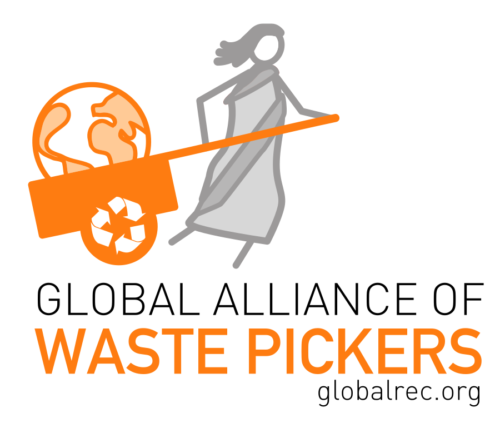
This document will be updated periodically as the COVID-19 pandemic unfolds. If you have information to contribute to this work, please send it to: cuidar@wiego.org and to info@globalrc.org. More information about Cuidar project. Icons and images used are part of Cuidar project.
#2. Shared experiences from Waste Pickers Oganizations around the world against Coronavirus (COVID-19) ⬆️
 Mbeubeuss: Declaration of the Waste Pickers Association on the occasion of May 1st - Workers in Senegal and around the world are celebrating Labor Day this year in a particular context marked by the coronavirus pandemic. The Bokk Diom Association wishes to expresses its sympathy to the victims and extend its support to the health organizations and the Senegalese authorities in the management of the pandemic as well as » read the post
Mbeubeuss: Declaration of the Waste Pickers Association on the occasion of May 1st - Workers in Senegal and around the world are celebrating Labor Day this year in a particular context marked by the coronavirus pandemic. The Bokk Diom Association wishes to expresses its sympathy to the victims and extend its support to the health organizations and the Senegalese authorities in the management of the pandemic as well as » read the post  Waste pickers from São Caetano do Sul abandoned amid the crisis - On June 8, 2020, amid the worst sanitary, economic and humanitarian crisis of the new millennium, the autarchy responsible for waste management in the municipality of São Caetano do Sul, one of the richest in the ABC region in São Paulo, cancelled the contract they had with the Waste Pickers and Recyclers Cooperative from São » read the post
Waste pickers from São Caetano do Sul abandoned amid the crisis - On June 8, 2020, amid the worst sanitary, economic and humanitarian crisis of the new millennium, the autarchy responsible for waste management in the municipality of São Caetano do Sul, one of the richest in the ABC region in São Paulo, cancelled the contract they had with the Waste Pickers and Recyclers Cooperative from São » read the post  Second call towards the constitution of a GlobalRec COVID Crisis Advisory Committee - On Monday, June 29th, 2020 the second online meeting for the constitution of the Global Advisory Committee took place with the participation of representatives from 15 countries. They came together to guide the organization of their global movement. The delegates (list below) met in order to share their current work- menaces during our pandemic crisis. » read the post
Second call towards the constitution of a GlobalRec COVID Crisis Advisory Committee - On Monday, June 29th, 2020 the second online meeting for the constitution of the Global Advisory Committee took place with the participation of representatives from 15 countries. They came together to guide the organization of their global movement. The delegates (list below) met in order to share their current work- menaces during our pandemic crisis. » read the post  First Call Towards the Constitution of a Globalrec COVID Crisis Advisory Committee - On Monday, June 15th, 2020 the first online meeting for the constitution of the Globalrec COVID Crisis Advisory Committee for the Global Alliance of Waste Pickers took place with the participation of representatives from 13 countries from the 5 continents. They came together to guide the organization of their global movement. The representatives of each » read the post
First Call Towards the Constitution of a Globalrec COVID Crisis Advisory Committee - On Monday, June 15th, 2020 the first online meeting for the constitution of the Globalrec COVID Crisis Advisory Committee for the Global Alliance of Waste Pickers took place with the participation of representatives from 13 countries from the 5 continents. They came together to guide the organization of their global movement. The representatives of each » read the post  Sign petition: Demand the right to work and survival for waste reclaimers during COVID-19 in South Africa - This is a demand by African Reclaimers Organisation to the National Coronavirus Command Council. Support the African Reclaimers Organisation, a worker’s movement of over 3,700 reclaimers in Gauteng, South Africa, in demanding that the National Command Council: drops the requirement for special permits for reclaimers to work. drops the requirement for IDs when distributing food. » read the post
Sign petition: Demand the right to work and survival for waste reclaimers during COVID-19 in South Africa - This is a demand by African Reclaimers Organisation to the National Coronavirus Command Council. Support the African Reclaimers Organisation, a worker’s movement of over 3,700 reclaimers in Gauteng, South Africa, in demanding that the National Command Council: drops the requirement for special permits for reclaimers to work. drops the requirement for IDs when distributing food. » read the post  Red LACRE’s Letter to Latin American and Caribbean States - The Latin American and Caribbean Network of Waste Pickers (LACRE Network) is an organization of national movements of grassroots waste pickers in the continent, with delegates from 17 countries. We participate in regional and global initiatives, alliances, and platforms, seeking to promote the effective recognition and economic, social, technical, and environmental inclusion of grassroots waste » read the post
Red LACRE’s Letter to Latin American and Caribbean States - The Latin American and Caribbean Network of Waste Pickers (LACRE Network) is an organization of national movements of grassroots waste pickers in the continent, with delegates from 17 countries. We participate in regional and global initiatives, alliances, and platforms, seeking to promote the effective recognition and economic, social, technical, and environmental inclusion of grassroots waste » read the post - Post- COVID 19 lockdown forecast for the informal recycling sector and suggestive interventions to help in the long term - 1. Preference may be given to waste to energy over recycling The recycling industries across the world and in India are completely shut. The supply chains of materials for recycling have been disrupted. Waste management has been identified as essential services. Waste is being collected from households. In the cities where segregation is in place, » read the post
 First ever MayDay Statement from the Global Informal Workers Movement - COVID-19 and the World’s Two Billion Informal Economy Workers A WIEGO Network Global Solidarity Platform May 1, 2020 Informal economy workers’ organizations across the global economy call on governments at all levels to partner with us on relief, recovery and resilience efforts that are emerging from the grassroots during this time of unprecedented crisis. Informal » read the post
First ever MayDay Statement from the Global Informal Workers Movement - COVID-19 and the World’s Two Billion Informal Economy Workers A WIEGO Network Global Solidarity Platform May 1, 2020 Informal economy workers’ organizations across the global economy call on governments at all levels to partner with us on relief, recovery and resilience efforts that are emerging from the grassroots during this time of unprecedented crisis. Informal » read the post  Waste Workers’ Safety during the COVID-19 pandemic (webinar) - The video of the webinar is available in YouTube. On Thursday April 30th, 2020, at 15:00h CEST the webinar Waste Workers’ safety during the COVID-19 pandemic, organized by UN-Habitat (Waste Wise Cities Campaign) and the Wuppertal Institute, will take place with the participation of FACCyR (Argentina) and Amelior (France), waste picker organizations from the Global » read the post
Waste Workers’ Safety during the COVID-19 pandemic (webinar) - The video of the webinar is available in YouTube. On Thursday April 30th, 2020, at 15:00h CEST the webinar Waste Workers’ safety during the COVID-19 pandemic, organized by UN-Habitat (Waste Wise Cities Campaign) and the Wuppertal Institute, will take place with the participation of FACCyR (Argentina) and Amelior (France), waste picker organizations from the Global » read the post  Indonesian Waste-pickers in a Dire Situation due to the COVID-19 Lock-down - World over the countries have enforced lockdown to reduce the spread of COVID-19 pandemic. This has created a lot of problems for the waste-pickers and other informal waste collectors, who rely on public space for work. They cannot venture out, pick up waste material, sort and sell it. The recycling industries are shut. The governments » read the post
Indonesian Waste-pickers in a Dire Situation due to the COVID-19 Lock-down - World over the countries have enforced lockdown to reduce the spread of COVID-19 pandemic. This has created a lot of problems for the waste-pickers and other informal waste collectors, who rely on public space for work. They cannot venture out, pick up waste material, sort and sell it. The recycling industries are shut. The governments » read the post  Solidarity Campaigns to Collect Funds for Waste Pickers in Coronavirus Times, Donate! - Since the beginning of the coronavirus crisis (COVID-19) we have compiled on the page of the Global Alliance of Waste Pickers the different initiatives and actions that different waste picker organizations around the world have developed to curb its impact. For a few days there have been several crowdfunding campaigns to raise funds to support » read the post
Solidarity Campaigns to Collect Funds for Waste Pickers in Coronavirus Times, Donate! - Since the beginning of the coronavirus crisis (COVID-19) we have compiled on the page of the Global Alliance of Waste Pickers the different initiatives and actions that different waste picker organizations around the world have developed to curb its impact. For a few days there have been several crowdfunding campaigns to raise funds to support » read the post - Suggestions for being considerate to the needs of migrant workers, single women, children and the aged in the COVID 19 relief operations - 06 April 2020 To Shri B. S. Yediyurappa Honourable Chief Minister Government of Karnataka Bengaluru Subject: Suggestions for being considerate to the needs of migrant workers, single women, children and the aged in the COVID 19 relief operations Respected Sir We appreciate the COVID 19 relief operations undertaken by the Government of Karnataka and Bruhat » read the post
- Informal workers of India seek safety and financial support from the national government to survive Covid 19 Pandemic - Statement of Working Peoples’ Charter on Coronavirus Crisis If India, with its brittle economy and even weaker healthcare infrastructure, is to survive the current Coronavirus pandemic without complete social, economic and physical breakdown, it will require drastic, radical and – most importantly – timely measures that are commensurate with the scale of the crisis. These » read the post
 Waste Pickers and Coronavirus (COVID-19) - Dear waste picker groups and allies around the world, In recognition of the urgent need to protect waste pickers against COVID-19 virus, we would like to collect and share recommendations for how waste pickers are protecting their health while maintaining their livelihoods. We are requesting information from you regarding the types of recommendations that waste » read the post
Waste Pickers and Coronavirus (COVID-19) - Dear waste picker groups and allies around the world, In recognition of the urgent need to protect waste pickers against COVID-19 virus, we would like to collect and share recommendations for how waste pickers are protecting their health while maintaining their livelihoods. We are requesting information from you regarding the types of recommendations that waste » read the post
Check in other languages (not yet translated) how other organizations are dealing with the COVID-19 crisis:
#3. Send your recommendation. How is your organization dealing with Coronavirus? ⬆️
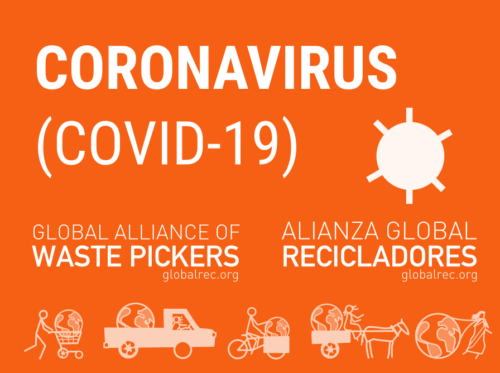
Dear waste picker groups and allies around the world,
In recognition of the urgent need to protect waste pickers against COVID-19 virus, we would like to collect and share recommendations for how waste pickers are protecting their health while maintaining their livelihoods. We are requesting information from you regarding the types of recommendations that waste pickers and their organizations have for occupational protection in the time of COVID-19 virus.
We plan to compile this information from around the world, have it reviewed by doctors within our network to ensure that we are not spreading any risky advice, and then share strategies and recommendations with our network of waste picker organizations. If you have some recommendations or strategies to share with us, please do so as soon as you can.
It would be helpful to know the following information:
- Name of your organization and contact information.
- Location of your organization.
- Type of services provided (door to door collection, informal picking, dumpsite picking, etc).
- Strategies that waste picker have for protecting themselves.
- Recommendations and training/outreach strategies that your organization is providing to waste pickers.
- Are you making any requests to residents to dispose of their waste differently right now?
- Specific challenges you are facing in the face of covid19.
- Specific requests your organization is making to the government or others regarding the protection of waste pickers or informal workers more generally.
You can reply to this message with your response or leave a comment in the page dedicated to this globalrec.org/covid19 in our website.
Thank you and sending health and solidarity to you all.
The Global Alliance of Waste Pickers


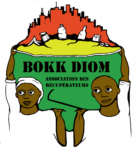
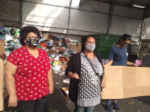


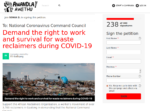





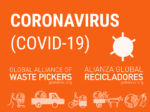


















Le Coeur Samuel (Amelior, Montreuil, France)
Comment by Le Coeur Samuel — March 17, 2020 @ 7:59 am
Simon Mbata (SAWPA, Sout African Waste Picker Association)
My greetings to all of you my dear comrades.
Hope you all well. Comrades things are getting worse in the case of the CORONA virus. As waste Pickers, the backbone of the recycling industry we will be the most affected when the spread hits our places. Economically while we still suffering the impacts of plastic imports and exports banning the virus will make the conditions worse as most economies will fall, the recycling industriy also will be impacted.
I urge all leaders to stand up and call upon our governments, private sector and civil society leaders and organizations to fundraise, fund, assist and work with waste Pickers to ensure waste Pickers have access to sanitizers.
Let’s call upon our governments to phase out the mixed waste systems and demand mandatory separation of waste from household.
Let’s call ZERO WASTE to landfills.
The South African Waste Pickers Association is releasing a media statement tomorrow. We hope all leaders and organizations in their respective countries will also release media statements on behalf of the waste workers, the backbone of the recycling economy. Aluta.
Comment by GlobalRec — March 19, 2020 @ 1:20 pm
Johnson Doe (Kpone Waste Picker Association, Ghana)
Great, waste pickers in Accra Ghana, based at Kpone landfill are seriously tackling this virus, The leadership of the organization is preparing to provide hand sanitizers and protective equipment,such as nose mask and gloves also a hygienic water for the group.
Even though the site was currently shut down, we are still mobilizing to engage in preventing our selves and our families from this virus. We also agree not to have any general meeting for the next six weeks till further notice. No request yet for the residents, education in ongoing on our own level and we are also engaging other pickers to speak one voice to the government on this to also remember the informal sector in this case.
Comment by GlobalRec — March 19, 2020 @ 1:23 pm
Hasiru Dala, Bangalore, India
We are more worried about Cholera breakout in Bangalore than Covid at this point of time at the community. Here’s what we are doing:
1. Staff are asked to take care of them self and those who feel their immunity level is low, they may not go to field to work, many other instructions as we have given others
2. With the help of the doctor who conduct our regular health Camps and with the staff, we have identified the communities that are more vulnerable because of their bad water source and bad toilet facility or lack of it. We starting door to door awareness to those communities. We are using the government media material.
We are trying to find nearest R.O water points near their area.
3. DWCC we have taken care of workers awareness about discarded masks, gloves etc..
4. Trying to bring awareness to citizens how to discard used materials
5. Bringing out communication materials for the community that will help them to understand easily. update from Bangalore.
More info in Pinky Chandran Facebook.
Comment by GlobalRec — March 19, 2020 @ 1:45 pm
Beautiful infographics! So educational!
Comment by Robert — August 19, 2021 @ 10:37 am